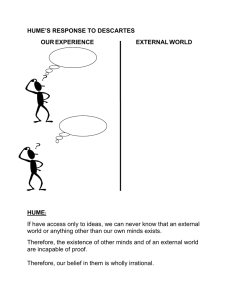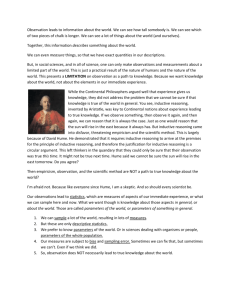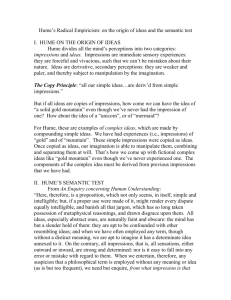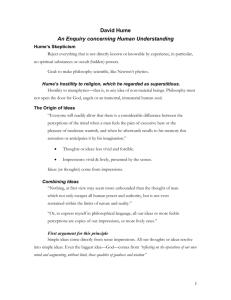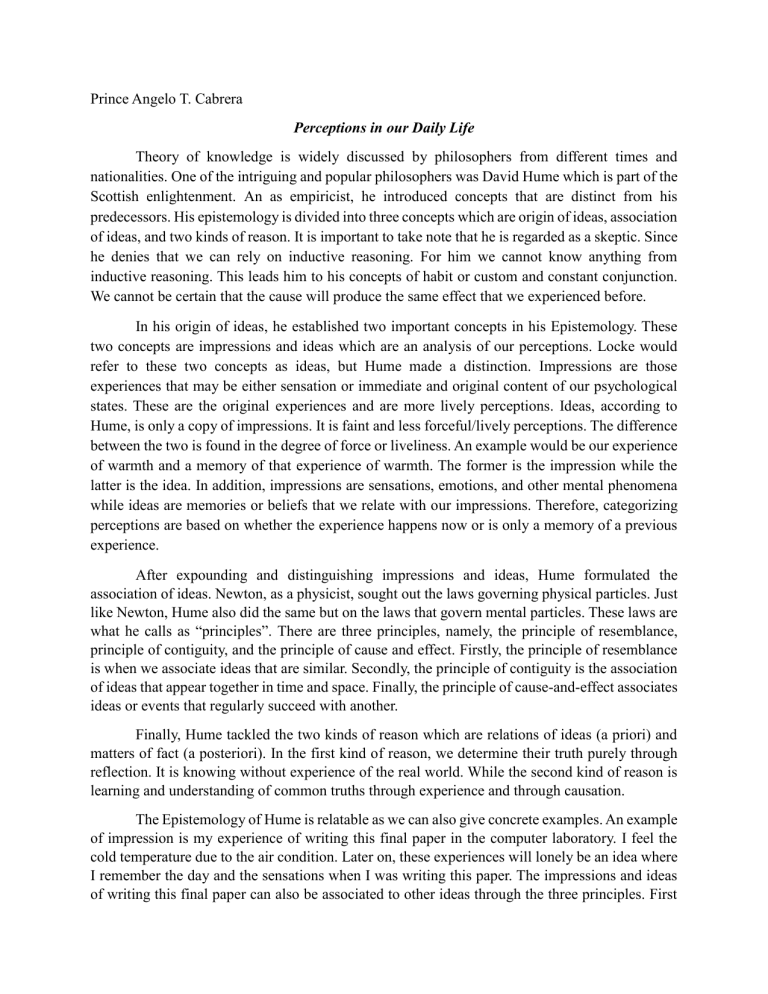
Prince Angelo T. Cabrera Perceptions in our Daily Life Theory of knowledge is widely discussed by philosophers from different times and nationalities. One of the intriguing and popular philosophers was David Hume which is part of the Scottish enlightenment. An as empiricist, he introduced concepts that are distinct from his predecessors. His epistemology is divided into three concepts which are origin of ideas, association of ideas, and two kinds of reason. It is important to take note that he is regarded as a skeptic. Since he denies that we can rely on inductive reasoning. For him we cannot know anything from inductive reasoning. This leads him to his concepts of habit or custom and constant conjunction. We cannot be certain that the cause will produce the same effect that we experienced before. In his origin of ideas, he established two important concepts in his Epistemology. These two concepts are impressions and ideas which are an analysis of our perceptions. Locke would refer to these two concepts as ideas, but Hume made a distinction. Impressions are those experiences that may be either sensation or immediate and original content of our psychological states. These are the original experiences and are more lively perceptions. Ideas, according to Hume, is only a copy of impressions. It is faint and less forceful/lively perceptions. The difference between the two is found in the degree of force or liveliness. An example would be our experience of warmth and a memory of that experience of warmth. The former is the impression while the latter is the idea. In addition, impressions are sensations, emotions, and other mental phenomena while ideas are memories or beliefs that we relate with our impressions. Therefore, categorizing perceptions are based on whether the experience happens now or is only a memory of a previous experience. After expounding and distinguishing impressions and ideas, Hume formulated the association of ideas. Newton, as a physicist, sought out the laws governing physical particles. Just like Newton, Hume also did the same but on the laws that govern mental particles. These laws are what he calls as “principles”. There are three principles, namely, the principle of resemblance, principle of contiguity, and the principle of cause and effect. Firstly, the principle of resemblance is when we associate ideas that are similar. Secondly, the principle of contiguity is the association of ideas that appear together in time and space. Finally, the principle of cause-and-effect associates ideas or events that regularly succeed with another. Finally, Hume tackled the two kinds of reason which are relations of ideas (a priori) and matters of fact (a posteriori). In the first kind of reason, we determine their truth purely through reflection. It is knowing without experience of the real world. While the second kind of reason is learning and understanding of common truths through experience and through causation. The Epistemology of Hume is relatable as we can also give concrete examples. An example of impression is my experience of writing this final paper in the computer laboratory. I feel the cold temperature due to the air condition. Later on, these experiences will lonely be an idea where I remember the day and the sensations when I was writing this paper. The impressions and ideas of writing this final paper can also be associated to other ideas through the three principles. First is the principle of resemblance entails the ideas or experience I had in writing other papers before this final paper. Second is the principle of contiguity, when I had the idea of writing final papers, I think of the computer laboratory or classroom. The thought of where I sat while writing this paper leads to the environment surrounding me. These may be the chairs, windows, and curtains. The idea of computer laboratory leads to room as a whole. Third is the principle of cause and effect. I wrote final papers and other written works before. Because of that experience, I have an idea of what would be the effect in writing these papers. At the end, I will feel joy as I submit the finished paper. I already have an idea of the effect because of a similar cause. There are things in life that we are not certain because we have not experienced those things. But there are times when we must try things first before becoming sure of it. This is where the relations of ideas and matters of fact comes in. If we were to know things certainly, that will make our life boring and predictable. Take not that Hume is a skeptic in a sense that he denies inductive reasoning. Because for him the causes and effects that we experienced before are entirely different to other causes and effects. It may be a similar cause, but the effect will always be distinct. I agree with his ideas on causality, but I do not deny inductive reasoning. Hume’s epistemology made realize the reason why our life is exciting. Even with doing the same things every day, there will always be something new or unique from our experience before. This is an assurance that we have something to look forward to in life. We can expect the unexpected. There is the motto, “Try and try until you succeed”. Because according to Hume, the effect of a similar cause will not be exactly the same. Personally, I am afraid of trying because of my regrets and failures. But I could not realize my mistake. I lost the will to try because I assumed that nothing would change, and that the same thing will happen again. What I considered a priori was actually an a posteriori. There are things in life that we must try and experience first. We could only assume that these may be the truth but what we need is the courage to try and learn for ourselves whether our hypothesis is true or not. I would like to encourage myself by not letting the regrets and failures hinder me. Because failures are opportunity to learn and grow. Everyday is a learning experience.
